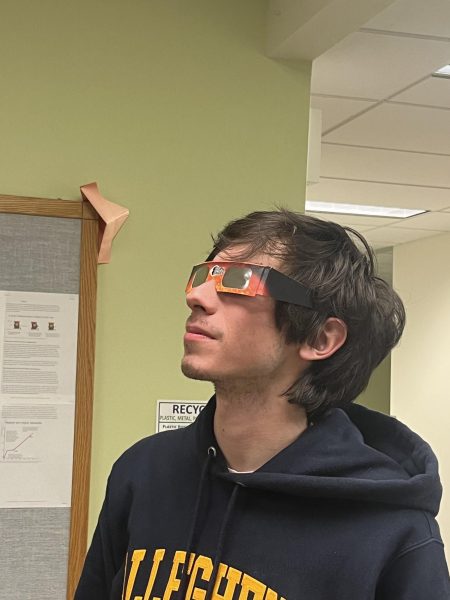Aviva Katz presents Tenth Annual Medical Ethics Lecture
Students crowded Quigley auditorium on Oct. 8 to attend the tenth annual medical ethics lecture, presented this year by Aviva Katz. Katz is the assistant professor of surgery at the University of Pittsburgh School of Medicine and director of the ethics consultation service at Children’s Hospital of Pittsburgh, and her lecture questioned, “Do good facts make good ethics?”
Although many lectures in the past have been academic based, Katz has lived through much of what she lectured on since she served as a surgical pediatrician. Recently, she has been working for embedding ethicists in all care rooms.
Kirsten Peterson, director of pre-professional studies and organizer of this year’s event, felt that the medical ethics issue is applicable to many different audiences.
“I am hoping that students will appreciate that medicine is messy, and that there are often issues that do not have clear cut answers. I believe that the value of this lectureship is less about the specific knowledge gained and more about the thought process that goes into making difficult decisions,” Peterson said.
She also added, “This lecture is specifically about medical ethics, and, therefore, especially relevant to a large portion of the Allegheny student population. But, at some point most of us are going to face difficult medical issues of our own, with our parents, with our children, and with other loved ones in our lives.”
Through her lecture, Katz focused mainly on fetuses that suffered from congenital diaphragmatic hernia (CDH). This is when the fetuses’ intestines fill up too much of the chest and leave little room for lung development. The condition has a high mortality rate, with medical practitioners not having gotten very far in understanding what causes the condition or the best way to treat it. One in 3000 infants are diagnosed with it a year.
Despite CDH’s high mortality rate, Katz said that practitioners must still view the fetus as a patient as well as the mother. Any attempts at care for the fetus affect the mother and must include her decisions, although they may not entirely align with the opinions of the physicians.
Another important thing to remember, Katz said, is that direct care is far more valuable than indirect care. In cases where direct care is given, physicians express informations, options, and advice to the patients, as opposed to with indirect care where patients do not get the physician’s personal advice.
If patients are to be influenced by the practitioner’s take on the situation, it is important that they recognize that each case must be dealt with with some basis of individuality. While evidence-based medicine is helpful in numerous ways, hesitation in following it completely is encouraged due to the fact that it may not be generalizable across all cultures and situations.
“What may be true academically may not necessarily be true in a clinical sense,” Katz explained.
Using only experience, however, is not a better option because it negates the experience of other physicians. Finding a balance between using evidence, experience and personal judgment are what Katz expressed as the most effective manner of evaluating a situation. Only when a patient is highly aware and educated on the situation and prognosis can they best make decisions for themselves.
Where many physicians struggle most, Katz believes, is in judging when to evaluate a patient as being overtaken by their disease. She finds it can be difficult to judge exactly when it is time to give up and avoid working toward unattainable goals.
“Medicine is gray,” Katz said, describing how dissimilar many situations can be.
These situations are evaluated by multidisciplinary teams, including those versed in everything from pediatric neurosurgery to genetic counseling and social work.
Denise Johnson, the chief medical officer of the Meadville Medical Center, has attended most of the lectures in the last five years. She has been working in medicine for the last eighteen years, but found this lecture particularly engaging.
“I used to do OB/GYN [obstetrics and gynaecology], so this was the same sort of issues we’ve dealt with. It’s very relevant,” Johnson said.
Emily Rajakovicz, ’17, found the ethical side to be engaging on a personal level as well.
“I want to be a medical malpractice lawyer, so I thought the ethical part of the discussion was really interesting,” Rajakovicz said.
Funded by Jack Lehman, ’54, and his wife, Deborah, Allegheny plans on continuing the annual medical ethics lectures in the future.








